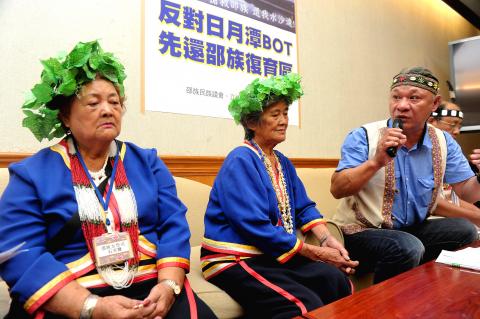Representatives from the Thao people — the original inhabitants of the area surrounding Sun Moon Lake (日月潭) in Nantou County — yesterday criticized the government for giving initial approval to a tourist resort project within their traditional territory on Hsiangshan (向山) without gaining the tribe’s permission in advance.
The build-operate-transfer (BOT) development project for the Hsiangshan tourist resort, financed by Hong Kong’s Bonds Group and given a real-estate development contract in 2009, gained initial approval from the Environmental Impact Assessment (EIA) specialist ad hoc meeting earlier this month.
However, Thao National Council chairman Banu Bagamumu said his tribe, which is now one of the smallest ethnic groups in Taiwan, with only about 700 people, was not consulted. He also accused the Council of Indigenous Peoples (CIP) of not standing up for the Thaos’ rights at the meetings.

Photo: CNA
Taiwan First Nations Party founding chairman Runquan Lhkatafatu (石慶龍), a Thao, said that after the Tourism Development and Promotion Committee last year said the area was not a traditional territory by law, the developer only held an information session for local residents earlier this year, without consulting tribe members.
Under Article 21 of the Aboriginal Basic Act (原住民基本法), developers should consult Aborigines and obtain their consent or participation, and share with them the benefits generated from developments in their territory.
Banu Bagamumu added that in 2008, the Cabinet authorized a plan for a 1,892 hectare Thao culture and living restoration park to be established in the area surrounding the Sun Moon Lake, with an approved budget of NT$553 million (US$18.46 million) over four years, but the county government keeps on postponing the execution of the plan, neglecting the rights to livelihood of the Thao.
“Already, five years have passed, less than 10 percent of the plan has been i executed and we feel despair that we have been fooled and deceived,” Runquan Lhkatafatu said, adding that the Nantou County Government is at fault for refusing to enforce the plan, and the Council of Indigenous Peoples is at fault for being inactive.
In response, deputy director of the council’s Department of Land Management Hsieh Ya-chieh (謝亞杰) said the council has always insisted that the planned development area is within the Thao traditional territory and that the developers must negotiate with tribe members.
Even after the Ministry of Justice said that claiming the traditional territory does not give it legal rights, the council still urged the EIA committee members to consider Article 19 of the EIA Act, which stipulates that activities that will cause significant negative affects to ethnic minority groups’ traditional living should be considered severe environmental impacts, he said, “but the committee members did not accept it.”
Sun Moon Lake National Scenic Area Administration Tourism Bureau secretary Chen Chih-shian (陳志賢) said the bureau proposed the plan in a bid to deal with the increasing number of tourists every year, and also plans to build cables between Hsiangshan and Jiji Township (集集) for gondola lifts.
Banu Bagamumu said that if the government does not respect their tribe and implement the restoration park plan, they will file a lawsuit with the International Court of Justice.

South Korean K-pop girl group Blackpink are to make Kaohsiung the first stop on their Asia tour when they perform at Kaohsiung National Stadium on Oct. 18 and 19, the event organizer said yesterday. The upcoming performances will also make Blackpink the first girl group ever to perform twice at the stadium. It will be the group’s third visit to Taiwan to stage a concert. The last time Blackpink held a concert in the city was in March 2023. Their first concert in Taiwan was on March 3, 2019, at NTSU Arena (Linkou Arena). The group’s 2022-2023 “Born Pink” tour set a

The Sports Administration yesterday demanded an apology from the national table tennis association for barring 17-year-old Yeh Yi-tian (葉伊恬) from competing in the upcoming World Table Tennis (WTT) United States Smash tournament in Las Vegas this July. The sports agency said in a statement that the Chinese Taipei Table Tennis Association (CTTTA) must explain to the public why it withdrew Yeh from the WTT tournament in Las Vegas. The sports agency said it contacted the association to express its disapproval of the decision-making process after receiving a complaint from Yeh’s coach, Chuang

The Hualien Branch of the High Court today sentenced the main suspect in the 2021 fatal derailment of the Taroko Express to 12 years and six months in jail in the second trial of the suspect for his role in Taiwan’s deadliest train crash. Lee Yi-hsiang (李義祥), the driver of a crane truck that fell onto the tracks and which the the Taiwan Railways Administration's (TRA) train crashed into in an accident that killed 49 people and injured 200, was sentenced to seven years and 10 months in the first trial by the Hualien District Court in 2022. Hoa Van Hao, a

The Taiwan High Court yesterday upheld a lower court’s decision that ruled in favor of former president Tsai Ing-wen (蔡英文) regarding the legitimacy of her doctoral degree. The issue surrounding Tsai’s academic credentials was raised by former political talk show host Dennis Peng (彭文正) in a Facebook post in June 2019, when Tsai was seeking re-election. Peng has repeatedly accused Tsai of never completing her doctoral dissertation to get a doctoral degree in law from the London School of Economics and Political Science (LSE) in 1984. He subsequently filed a declaratory action charging that